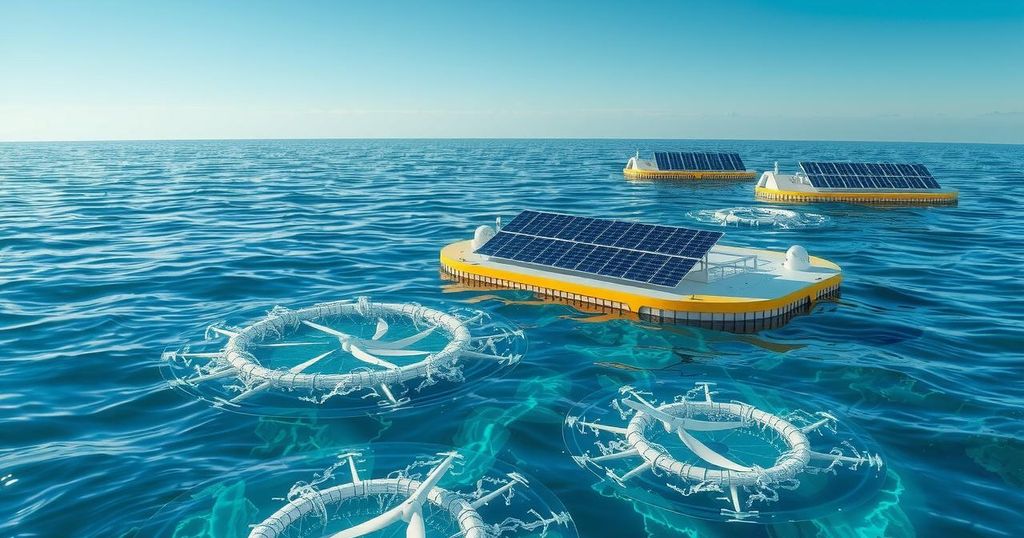Exploring Ocean-Climate Innovation: Trends in Blue Tech Development
The ocean plays a crucial role in Earth’s climate and economy, absorbing significant carbon emissions while supporting billions. Startups are emerging in ocean-climate innovation, focusing on technologies that tackle both climate and ocean challenges. Despite limited investment in this sector, federal initiatives and growing interest from entrepreneurs signal a promising future for ocean-climate tech solutions.
The ocean is pivotal in stabilizing Earth’s climate and providing crucial resources, harboring 50 times more carbon than the atmosphere while absorbing 25% of carbon emissions. With a gross marine product of $2.5 trillion, it ranks as the eighth largest global economy, directly supporting over three billion livelihoods and serving as a primary protein source for nearly one billion people. Yet, less than 3% of climate tech investment targeted technologies in proximity to the ocean, a gap that beckons further funding at the ocean-climate nexus.
The ocean-climate nexus embodies the interlinked nature of our ocean and climate systems, driven by innovations aimed at combating both climate change and ocean challenges. Entrepreneurs are venturing beyond the confines of traditional categories like blue tech, seeking innovative solutions where the oceans intersect with economic activity. This sector is witnessing startups developing cutting-edge technologies addressing biodiversity loss and ocean pollution, encapsulated within the broader spectrum of ocean-related tech.
Amidst this innovation wave, marine carbon dioxide removal (mCDR) is emerging, with startups exploring ways to capture and sequester CO2 directly from seawater. Techniques such as electrochemically extracting CO2 and enhancing carbon sink potential via limestone weathering are in development, addressing the climate crisis while leveraging ocean resources for carbon storage.
In the industrial sector, advancements are catering to reducing energy and water consumption, enhancing operational efficiencies, and mitigating the environmental impact of heavy industries, notably maritime and wastewater sectors. The shipping industry, which contributed significantly to trade but also emissions, is seeing innovations like electrification tech and alternative fuels as it strives to decarbonize under regulatory pressures.
Organics represents another vibrant area, showcasing novel biological technologies across food, agriculture, and pharmaceuticals, including aquaculture tech and algae-based innovations. The U.S. leads globally in seafood production, with many startups optimizing fish farming practices and advocating for sustainable supply chains, underscoring a pivotal shift toward environmentally friendly food sources driven by consumer demand.
Over the past decade, ocean-climate tech startups have attracted over $5 billion in venture funding, yet many have not yet secured larger rounds, indicating growth potential in this domain. Despite uneven development across sectors, the increasing federal focus on ocean technologies, highlighted by the Ocean Policy Committee’s recent initiatives, lays a supportive groundwork for innovation and investment.
Awareness around ocean-climate tech is surging, backed by governmental strategies aiming to leverage the oceans in combating climate change. The Ocean Climate Action Plan outlines clear goals, pushing for a reduction in ocean-based emissions and promoting nature-based solutions. Recent funding channels, including the Inflation Reduction Act, are designed to bolster startups in this crucial field, aligning with both economic and environmental objectives.
In summary, the ocean’s indispensable role in climate regulation and economic vitality highlights a critical area ripe for innovation. Startups at the ocean-climate nexus are pioneering technologies that promise to address pressing environmental challenges while also enhancing economic stability for billions. With increasing investment and supportive federal initiatives, the future of ocean-climate tech looks promising, poised for growth and transformative impact.
Original Source: www.jpmorgan.com




Post Comment